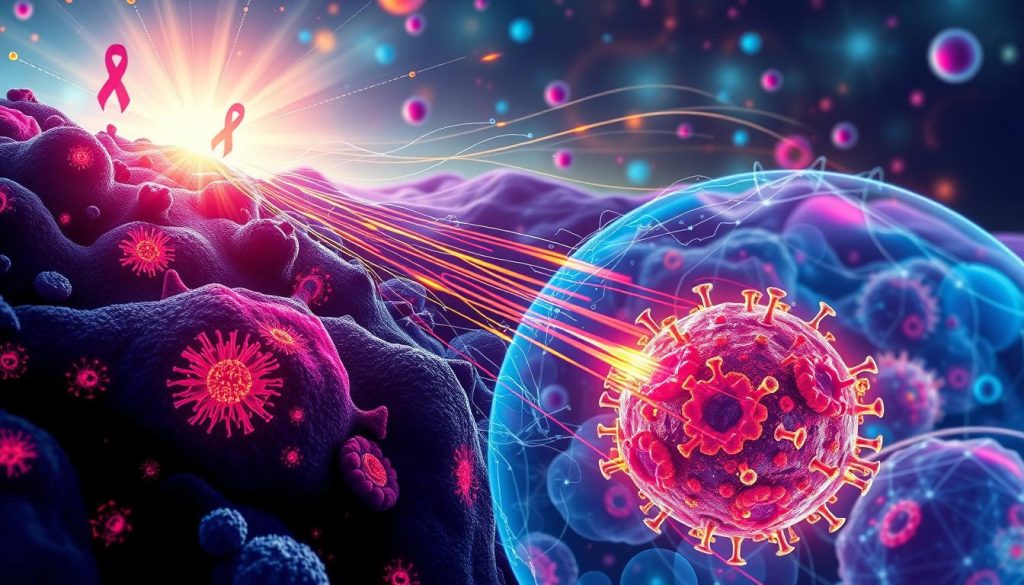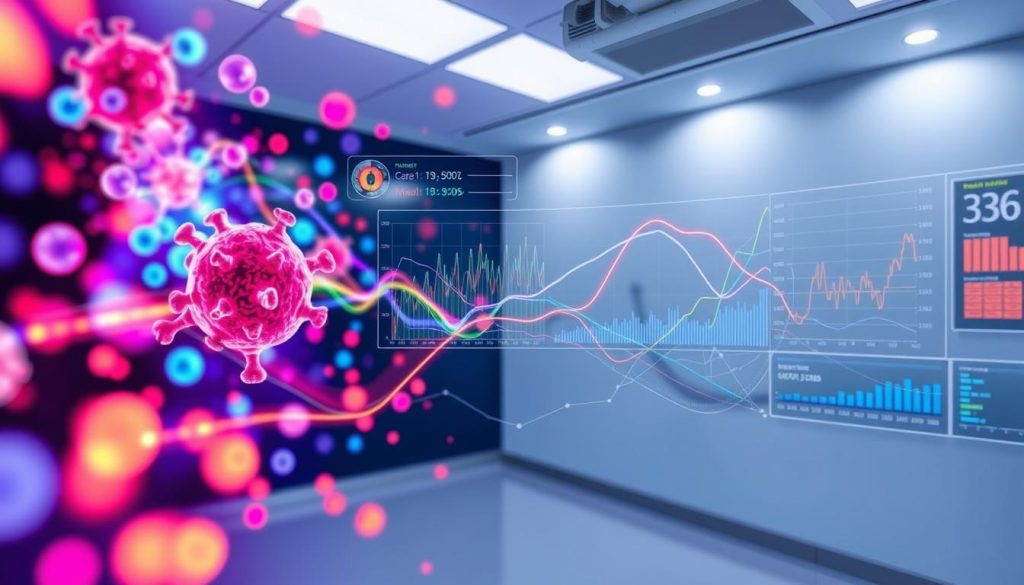CAR T-cell therapy is a new hope for people with advanced or relapsed blood cancers. It uses the body’s immune system to attack cancer cells. This has led to many success stories. But, many wonder, “How long does CAR T-cell therapy take to work?”
Knowing how long CAR T-cell therapy lasts is important. It helps manage expectations and supports those going through treatment. While results can vary, understanding the general timeline can ease worries.
In this article, we’ll look at what affects the length of CAR T-cell therapy. We’ll also talk about the typical time it takes to see its effects. Our goal is to give patients and their families the knowledge they need. This way, they can face this cancer treatment with confidence and hope.
Understanding the Basics of CAR T-Cell Therapy
CAR T-cell therapy is a new way to fight cancer. It uses the body’s immune system to attack cancer cells. This method has been successful in treating blood cancers like leukemia and lymphoma. Scientists are also looking into using it for solid tumors.
Before we dive into how well CAR T-cell therapy works, let’s learn the basics.
What is CAR T-Cell Therapy?
CAR T-cell therapy changes a patient’s T-cells to fight cancer. T-cells are a type of white blood cell. They are made to find and kill cancer cells.
To start, a blood sample is taken from the patient. T-cells are then pulled out and changed in a lab. They are made to have a special protein called CAR.
The changed T-cells are then grown and put back into the patient. There, they can find and kill cancer cells.
How CAR T-Cell Therapy Works
After the T-cells are put back into the body, they start to grow. They look for cancer cells to attack. The CAR protein helps them find these cells.
When they find cancer cells, the T-cells get active. They release chemicals that help the immune system. This leads to the T-cells killing the cancer cells.
The time it takes for CAR T-cell therapy to work varies. We’ll look at this in more detail later. But the main idea is to use the body’s immune system to fight cancer.
Factors Affecting CAR T-Cell Therapy Response Time
The time it takes for CAR T-cell therapy to work can differ for each patient. Several key factors influence this. Knowing these can help patients and their families understand the treatment better and manage their expectations.
Type and Stage of Cancer
The type and stage of cancer greatly affect how fast CAR T-cell therapy works. Patients with more advanced cancers might take longer to see results. Those with earlier stages might see improvements sooner. Here’s a table showing typical response times for different cancers:
| Cancer Type | Stage | Average Response Time |
|---|---|---|
| Non-Hodgkin Lymphoma | Early (I-II) | 2-4 weeks |
| Non-Hodgkin Lymphoma | Advanced (III-IV) | 4-8 weeks |
| Acute Lymphoblastic Leukemia | All stages | 2-6 weeks |
| Multiple Myeloma | All stages | 4-12 weeks |
Patient’s Overall Health
A patient’s health and immune system greatly affect how fast CAR T-cell therapy works. Those with stronger immune systems and fewer health issues tend to respond faster. Dr. Sarah Thompson, a top oncologist, explains:
“Patients who are generally healthier and have a stronger immune system tend to have a better and faster response to CAR T-cell therapy. This highlights the importance of maintaining overall health during cancer treatment.”
CAR T-Cell Therapy Dosage
The amount of CAR T-cells given also affects response time. Higher doses can lead to quicker results but also increase the risk of side effects. Doctors aim to find the right balance to maximize effectiveness while minimizing risks.
By looking at cancer type, stage, patient health, and treatment dosage, doctors can tailor CAR T-cell therapy. This helps patients understand when they might start seeing results.
Initial Response to CAR T-Cell Therapy
After getting CAR T-cells, patients usually see a response in the first few weeks. The immune cells start to grow and fight cancer cells. Doctors watch them closely to see how they’re doing and handle any side effects.
Common side effects during this time include:
- Fever and chills
- Fatigue
- Nausea and vomiting
- Headaches
- Difficulty breathing
How bad and long these side effects last can differ for everyone. Sometimes, they can be so severe that patients need to stay in the hospital. This is often due to cytokine release syndrome (CRS), when the immune system gets too active.
As Dr. Sarah Thompson, an oncologist at the University of California, explains,
“The initial response period is key in figuring out how long CAR T-cell therapy takes to work. We watch patients for signs of an initial response, like smaller tumors or better symptoms.”
The time it takes to see the first of CAR T-cell therapy varies. It depends on the cancer type and stage, the patient’s health, and the CAR T-cell product used. Some patients might start to feel better in days, while others might take weeks.
Monitoring Progress After CAR T-Cell Therapy
After CAR T-cell therapy, patients need regular check-ups and tests. This ensures the treatment is working right. Doctors can then adjust the care plan as needed.
Follow-up Appointments and Tests
Patients usually see their doctor a few weeks after therapy. Doctors will:
- Do physical exams
- Run blood tests to check for cancer and health
- Do imaging scans to see tumor size and location
- Watch for therapy side effects
The time between follow-ups can change based on the patient’s needs and how they’re doing. As things get better, visits might not be as often.
Assessing Treatment Effectiveness
It’s important to see if CAR T-cell therapy is working. Doctors use different ways to check, like:
- Tumor markers: Blood tests for cancer proteins show how well treatment is going.
- Minimal residual disease (MRD) testing: Tests find small cancer cells left in the body.
- Biopsy: Sometimes, a tissue sample is taken to check cancer cells directly.
“Monitoring progress and assessing treatment effectiveness are essential components of post-CAR T-cell therapy care. By staying vigilant and proactive, patients and their healthcare teams can work together to ensure the best possible outcomes.”
It’s important for patients and doctors to talk often. This helps keep track of how the treatment is going. With regular check-ups and careful checks, doctors can make sure each patient gets the best care possible.
Typical Timeline for CAR T-Cell Therapy Results
Patients often wonder about the typical results timeline for car t-cell therapy. While experiences vary, knowing the general timeline can help. It sets expectations and offers hope during treatment.
In the first weeks after CAR T-cell infusion, patients may face side effects. Their immune system is adapting to the new cells. Close monitoring is key to manage any issues and keep the patient safe.
As CAR T-cells multiply and target cancer cells, some notice early signs of response. These signs include:
- Reduction in tumor size
- Improvement in cancer-related symptoms
- Increased energy levels
But not all patients see immediate results. The car t-cell therapy timeline varies. It depends on cancer type, stage, patient health, and CAR T-cell product.
“The waiting period after CAR T-cell therapy can be challenging, but it’s vital to stay patient and hopeful. Every person’s journey is unique, and results timelines can differ.” – Dr. Sarah Thompson, Oncologist
Typically, the first formal assessment of treatment response is 1 to 3 months after infusion. This may include imaging tests and blood tests to check tumor size and CAR T-cell presence.
| Timeline | Assessment |
|---|---|
| 1-3 months | Initial response evaluation (imaging tests, blood tests) |
| 3-6 months | Continued monitoring and follow-up assessments |
| 6+ months | Long-term follow-up to assess durability of response |
After the initial response, ongoing monitoring is needed. Follow-up appointments and tests are scheduled to track progress and catch any relapse or late side effects.
The typical results timeline for CAR T-cell therapy is an ongoing research area. As more data comes in, our understanding will grow. Patients should discuss their timeline and concerns with their healthcare team.
How Long Does CAR T-Cell Therapy Take to Work
Patients and their families often wonder how long CAR T-cell therapy takes to work. The time it takes to see results can vary. This depends on the cancer type, its stage, the patient’s health, and the CAR T-cell therapy used.
Short-term Results
Some patients see quick results within days or weeks after treatment. These early signs can include:
- Reduction in tumor size
- Improvement in cancer-related symptoms
- Increased energy levels and overall well-being
But, not everyone will see these quick results. Not seeing them right away doesn’t mean the treatment has failed.

Long-term Outcomes
The main goal of CAR T-cell therapy is to achieve long-term results. This means lasting remission or even a cure. To check if the treatment is working, patients have regular follow-ups and tests. These can include:
| Follow-up Test | Purpose | Frequency |
|---|---|---|
| Imaging scans (e.g., CT, PET) | Monitor changes in tumor size and location | Every 3-6 months |
| Blood tests | Evaluate blood cell counts and markers of cancer activity | Monthly or as needed |
| Bone marrow biopsies | Assess the presence of cancer cells in the bone marrow | As determined by the healthcare team |
Long-term results can take months or even years. Regular monitoring is key. It helps ensure the treatment keeps working and catches any relapse early.
“CAR T-cell therapy has shown remarkable promise in providing long-lasting remissions for some patients with advanced blood cancers, giving hope where conventional treatments have failed.” – Dr. James L. Gulley, National Cancer Institute
As research improves CAR T-cell therapy, more patients may see long-term benefits. This could lead to a brighter future in cancer treatment.
Signs of Successful CAR T-Cell Therapy Response
When patients get CAR T-cell therapy, it’s important to watch how they react. Doctors look for signs that show the treatment is working. These signs give hope to patients and help doctors decide what to do next.
Reduction in Tumor Size
Seeing tumors get smaller is a big sign of success with CAR T-cell therapy. Doctors use scans to check tumor sizes before and after treatment. If tumors shrink a lot, it means the CAR T-cells are killing cancer cells.
How much tumors shrink can differ for each patient. Some might see tumors disappear completely. Others might see a big drop in size but not all the way.
Improved Blood Cell Counts
Another important sign is when blood cell counts get better. Cancer can mess with how our bodies make blood cells. When CAR T-cells fight cancer, blood cell counts often go back to normal.
Doctors keep an eye on a few blood cell types:
- White blood cells (WBCs): More WBCs, like lymphocytes, mean the immune system is fighting cancer.
- Red blood cells (RBCs): More RBCs help carry oxygen better and reduce anemia symptoms.
- Platelets: More platelets help blood clot and lower the risk of bleeding.
The table below shows how blood cell counts might improve with successful CAR T-cell therapy:
| Blood Cell Type | Before Treatment | After Successful Treatment |
|---|---|---|
| White Blood Cells (per μL) | 2,500 | 5,000 |
| Red Blood Cells (millions per μL) | 3.2 | 4.5 |
| Platelets (per μL) | 80,000 | 150,000 |
Checking blood cell counts often helps doctors see if CAR T-cell therapy is working. This helps them plan the best treatment for the future.
Potential Challenges and Side Effects
CAR T-cell therapy has shown great success in fighting some cancers. Yet, it comes with challenges and side effects. The immune system’s fight against cancer can sometimes get too strong, causing problems.
One common side effect is cytokine release syndrome (CRS). It happens when the immune system releases too many cytokines. This can cause fever, chills, and low blood pressure. In severe cases, it can damage organs and need intensive care.

Neurological toxicity is another complication. It can cause confusion, seizures, or trouble speaking. These symptoms usually show up in the first few weeks after treatment. They can be treated with quick medical help.
The table below lists some common side effects of CAR T-cell therapy:
| Side Effect | Symptoms | Management |
|---|---|---|
| Cytokine Release Syndrome (CRS) | Fever, chills, low blood pressure, organ dysfunction | Supportive care, tocilizumab, corticosteroids |
| Neurological Toxicity | Confusion, seizures, difficulty speaking | Supportive care, corticosteroids |
| B-cell Aplasia | Low levels of B-cells, increased risk of infections | Intravenous immunoglobulin (IVIG) replacement therapy |
These challenges and side effects can be scary. But, the healthcare team is ready to handle them. They closely watch patients and quickly fix any problems. This helps the CAR T-cells fight cancer without delays.
Importance of Patience and Perseverance
When you’re going through CAR T-cell therapy, the road to recovery isn’t always easy. This treatment uses your immune system to fight cancer. It’s key to be patient and persistent during this time.
Patricia Hurrod from Mississippi is a great example of these qualities. She had CAR T-cell therapy for her B cell lymphoma after other treatments didn’t work. Even though her cancer came back, she kept going with this new therapy.
Coping with Uncertainty During Treatment
Dealing with uncertainty is a big challenge for CAR T-cell therapy patients. The time it takes to see results and the side effects can make you feel anxious. Here are some ways to cope:
- Talk openly with your healthcare team
- Get support from family and friends
- Try stress-reducing activities like meditation
“I knew I had to stay strong and keep fighting, even when the future seemed uncertain. My faith and the support of my family kept me going.” – Patricia Hurrod
Maintaining a Positive Outlook
Keeping a positive attitude is vital during CAR T-cell therapy. Even when it’s tough, thinking about the chance of success can give you strength. Here are some tips to stay positive:
| Strategy | Benefits |
|---|---|
| Set realistic goals | Helps you feel a sense of purpose |
| Celebrate small victories | Boosts your mood and motivation |
| Surround yourself with positivity | Creates a supportive and uplifting space |
Patricia Hurrod’s story is an inspiration to those fighting aggressive cancer. Her patience and perseverance have helped her make good progress and possibly recover fully.
Supporting a Loved One Undergoing CAR T-Cell Therapy
When a family member or friend is going through CAR T-cell therapy, they need your support. Supporting a loved one during this time can greatly improve their emotional state. It can also make their experience better overall.
Being there to listen and offer comfort is key. Encourage your loved one to share their feelings and worries. Let them know you’re there for them, no matter what.
Helping out with daily tasks can really help. You can assist with grocery shopping, cooking, or cleaning. Going to medical appointments with them and taking notes is also helpful. It ensures important information isn’t missed.
“The love and support of my family kept me going through the toughest days of my CAR T-cell therapy journey. Their presence and unwavering dedication meant the world to me.”
Learning about CAR T-cell therapy and its side effects is important. This knowledge helps you understand what your loved one is going through. It lets you offer better support. Attend sessions, read reliable sources, and ask the healthcare team questions.
Don’t forget to take care of yourself, too. Supporting a loved one through cancer treatment can be tough. Make time for activities that help you relax, like exercise or hobbies. By taking care of yourself, you’ll be more able to support your loved one during their CAR T-cell therapy.
Advancements in CAR T-Cell Therapy Efficacy
Researchers are making big strides in CAR T-cell therapy. They aim to make it more effective and faster. This means better results for patients.
Ongoing Research and Clinical Trials
Many studies and trials are working on CAR T-cell therapy. They focus on a few key areas:
- Creating new CAR designs to better fight cancer
- Improving how CAR T-cells are made to be stronger and last longer
- Testing combinations with other treatments to boost results
These efforts aim to make the therapy work better and faster. For example, a new CAR T-cell design showed a remarkable 93% response rate in advanced lymphoma patients. Many saw improvements in just a few weeks.
Future Prospects for Improved Response Times
Experts think CAR T-cell therapy will get even better. They see a future with faster and more reliable results. Some promising changes include:
| Advancement | Potential Impact |
|---|---|
| Next-generation CAR designs | Enhanced cancer cell targeting and faster elimination |
| Streamlined manufacturing processes | Quicker production of CAR T-cells, reducing treatment delays |
| Personalized treatment approaches | Tailored therapies that optimize response times for individual patients |
“The future of CAR T-cell therapy is incredibly exciting. With ongoing research and advancements in efficacy, we can expect to see more patients experiencing rapid and durable responses to this groundbreaking treatment.”
As CAR T-cell therapy keeps improving, patients and their families have more hope. They look forward to a future where this treatment offers quick and lasting relief from cancer.
When to Discuss Concerns with Your Healthcare Team
During your CAR T-cell therapy, talking openly with your healthcare team is key. You should share any worries, questions, or changes in your health. This way, you get the best care possible. A strong partnership with your doctors helps tackle any treatment issues.
Tell your healthcare team about any side effects or symptoms, big or small. Some common things to talk about include:
- Fever or chills
- Persistent fatigue
- Changes in appetite or weight
- Pain or discomfort
- Cognitive changes, such as confusion or memory issues
Your healthcare team is there to support you. They can help with side effects, medication changes, or finding resources for the therapy’s challenges. Don’t be shy to reach out when you need help.

Regular check-ups are vital for discussing concerns and tracking your progress. These visits help your team see how you’re doing, do tests, and adjust your treatment plan. Make sure to go to all your scheduled appointments and come ready with questions.
“The key to successful CAR T-cell therapy is open and honest communication between patients and their healthcare team. By working together, we can ensure the best possible outcomes and quality of life for those undergoing this innovative treatment.”
– Dr. Sarah Johnson, Oncologist
Having a support system of family and friends is also important. They can help you through the tough times of CAR T-cell therapy. Encourage them to come to appointments for emotional support and to help remember important details.
| When to Contact Your Healthcare Team | Examples |
|---|---|
| New or worsening symptoms | Fever, pain, cognitive changes |
| Questions about treatment or side effects | Managing fatigue, dietary concerns |
| Emotional support and coping strategies | Anxiety, depression, stress management |
Remember, your healthcare team is your partner in your CAR T-cell therapy journey. By keeping communication open and discussing concerns quickly, you can ensure the best care and outcomes together.
Life After CAR T-Cell Therapy
After CAR T-cell therapy, patients start a new journey of recovery and adjustment. The treatment is a big step, but healing doesn’t stop there. Patients and their families face challenges in follow-up care, ongoing checks, and adjusting to a new normal.
Follow-up Care and Monitoring
After CAR T-cell therapy, patients need careful follow-up care. This ensures the treatment works well over time and catches any problems early. This care includes:
- Regular check-ups with the medical team
- Monitoring of blood cell counts and organ function
- Screening for signs of infection or other side effects
- Assessing the treatment’s efficacy through imaging tests and biopsies
The number and length of follow-up visits can change based on each patient’s needs. But, staying in close touch with the healthcare team is key for the best recovery and life after therapy.
Adjusting to a New Normal
Returning to daily life after CAR T-cell therapy can be tough. Patients often feel tired, weak, and may have trouble thinking clearly. They need to adjust their daily plans as they get stronger.
“After my CAR T-cell therapy, I had to relearn what my body was capable of. It was a slow process, but with the support of my family and medical team, I found my new normal.” – Sarah, CAR T-cell therapy survivor
Emotional support is also very important during this time. Patients might feel many emotions, like relief, gratitude, anxiety, or uncertainty. Talking to support groups, counselors, and other survivors can offer great help and encouragement as they move forward in their life after therapy.
CAR T-Cell Therapy Success Stories
Throughout the journey of cancer treatment, patient experiences and success stories serve as beacons of hope. They inspire those navigating the challenging path. CAR T-cell therapy has brought triumphs to many, showing its power and promise.
Emily, a young leukemia patient, had tried everything but CAR T-cell therapy. Thanks to this treatment, her cancer went into remission. Her story is a beacon of hope for others facing similar battles.
Michael, a lymphoma survivor, had lost hope after years of fighting. But CAR T-cell therapy gave him a second chance. It not only cured his cancer but also allowed him to see his first grandchild born.
These stories show the power of CAR T-cell therapy and the human spirit’s resilience. They offer hope to those fighting their battles. As research advances and more stories are shared, the promise of CAR T-cell therapy grows. It shines as a beacon of light for those in need of a miracle.
FAQ
Q: What is the typical timeline for seeing results from CAR T-cell therapy?
A: The time it takes to see results from CAR T-cell therapy varies. Some people may see changes in a few weeks. But, it’s important to keep watching to see how long the effects last. Talk to your doctor about what to expect.
Q: How does the type and stage of cancer affect CAR T-cell therapy response time?
A: The type and stage of cancer can change how long it takes for CAR T-cell therapy to work. More serious cancers might take longer to respond. But, cancers caught early might show results sooner. Your doctor will consider these factors when talking about your treatment plan.
Q: What signs indicate a successful response to CAR T-cell therapy?
A: A good sign of CAR T-cell therapy working is when tumors shrink and blood cell counts improve. Doctors watch these signs closely. They use them to see if the therapy is working well and make decisions about your care.
Q: How can I cope with the uncertainty of waiting for CAR T-cell therapy results?
A: Waiting for CAR T-cell therapy results can be tough. It’s important to talk openly with your doctor, get support from family and friends, and take care of yourself. Remember, everyone’s experience is different, and being patient is key.
Q: What are some common side effects that can affect the CAR T-cell therapy timeline?
A: Side effects like cytokine release syndrome and neurological toxicities can slow down how long it takes to see results. These issues might need extra care and monitoring. Your doctor will try to manage these challenges to help you get the best results.
Q: How can I support a loved one undergoing CAR T-cell therapy?
A: Supporting a loved one with CAR T-cell therapy means being there emotionally and practically. Listen, help out with daily tasks, and encourage them. Learning about the therapy and its timeline can also help you support them better.
Q: Are there ongoing advancements in CAR T-cell therapy efficacy?
A: Yes, scientists are always working to make CAR T-cell therapy better. They’re doing clinical trials and finding new ways to improve it. These efforts aim to make the therapy work faster, with fewer side effects, and better long-term results. Talk to your doctor about the latest news.
Q: What should I expect in terms of follow-up care after CAR T-cell therapy?
A: After CAR T-cell therapy, you’ll need regular check-ups to see how you’re doing. This might include tests and blood work. Your doctor will create a plan for follow-up care to help you stay healthy and happy.


















